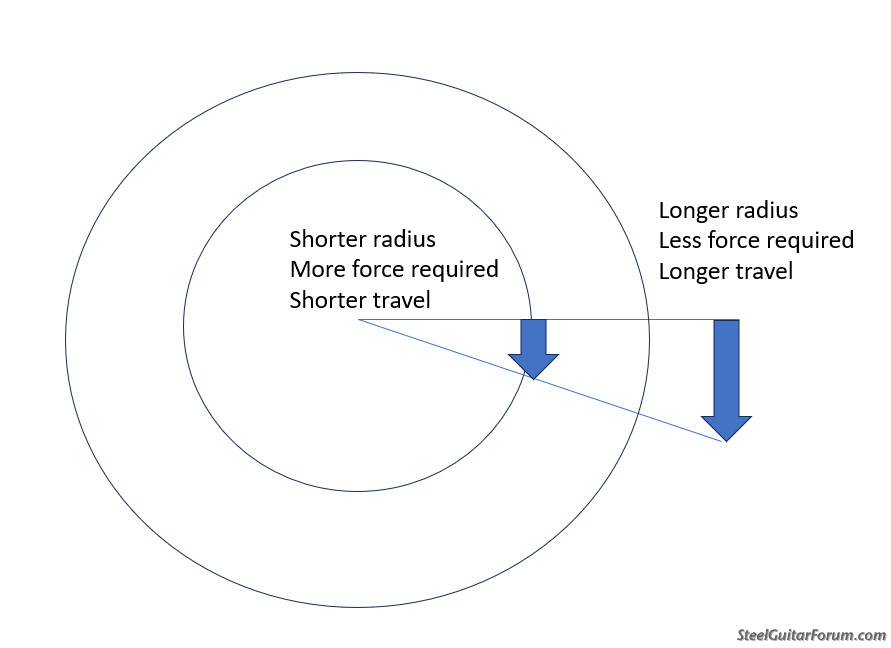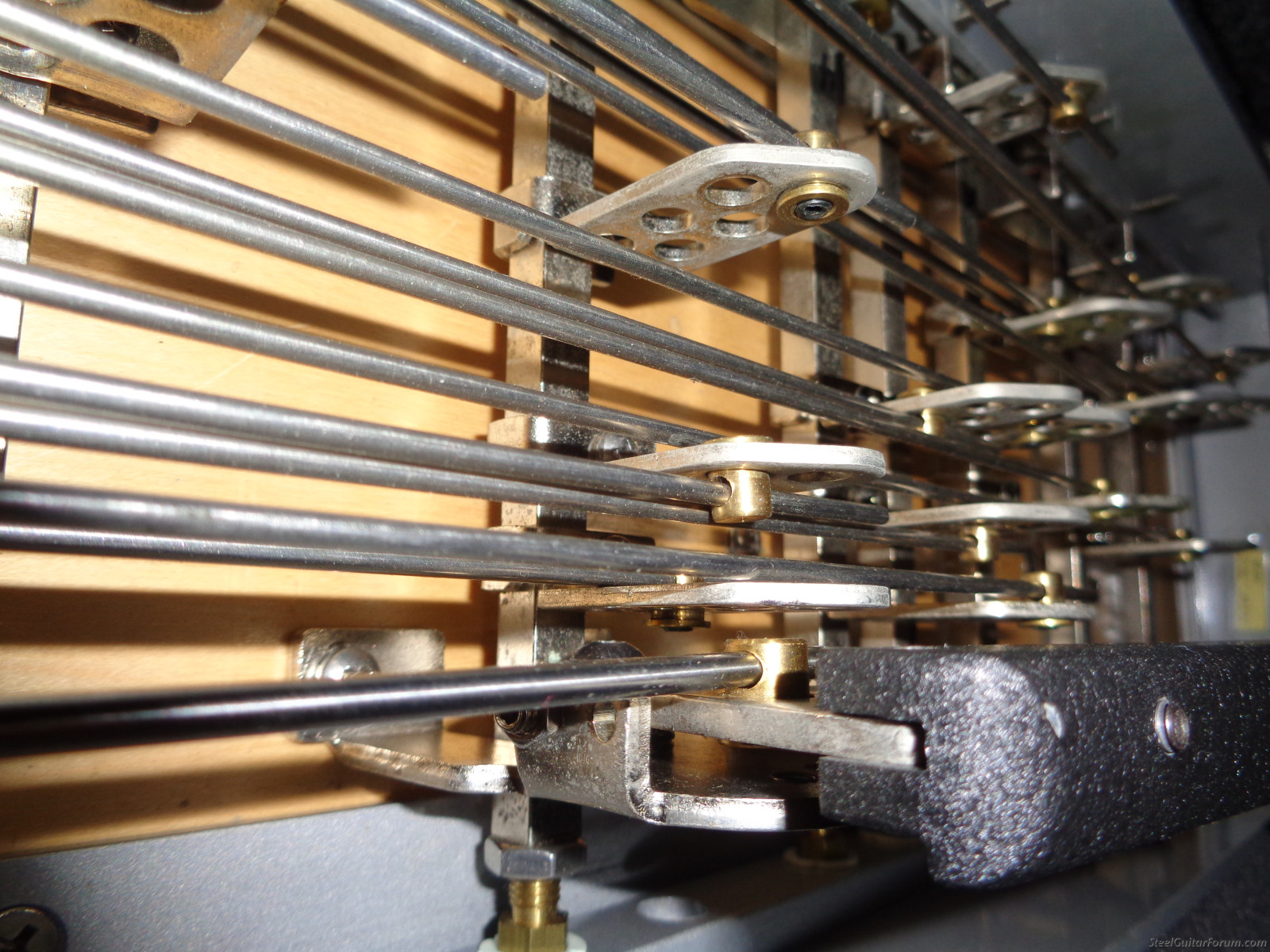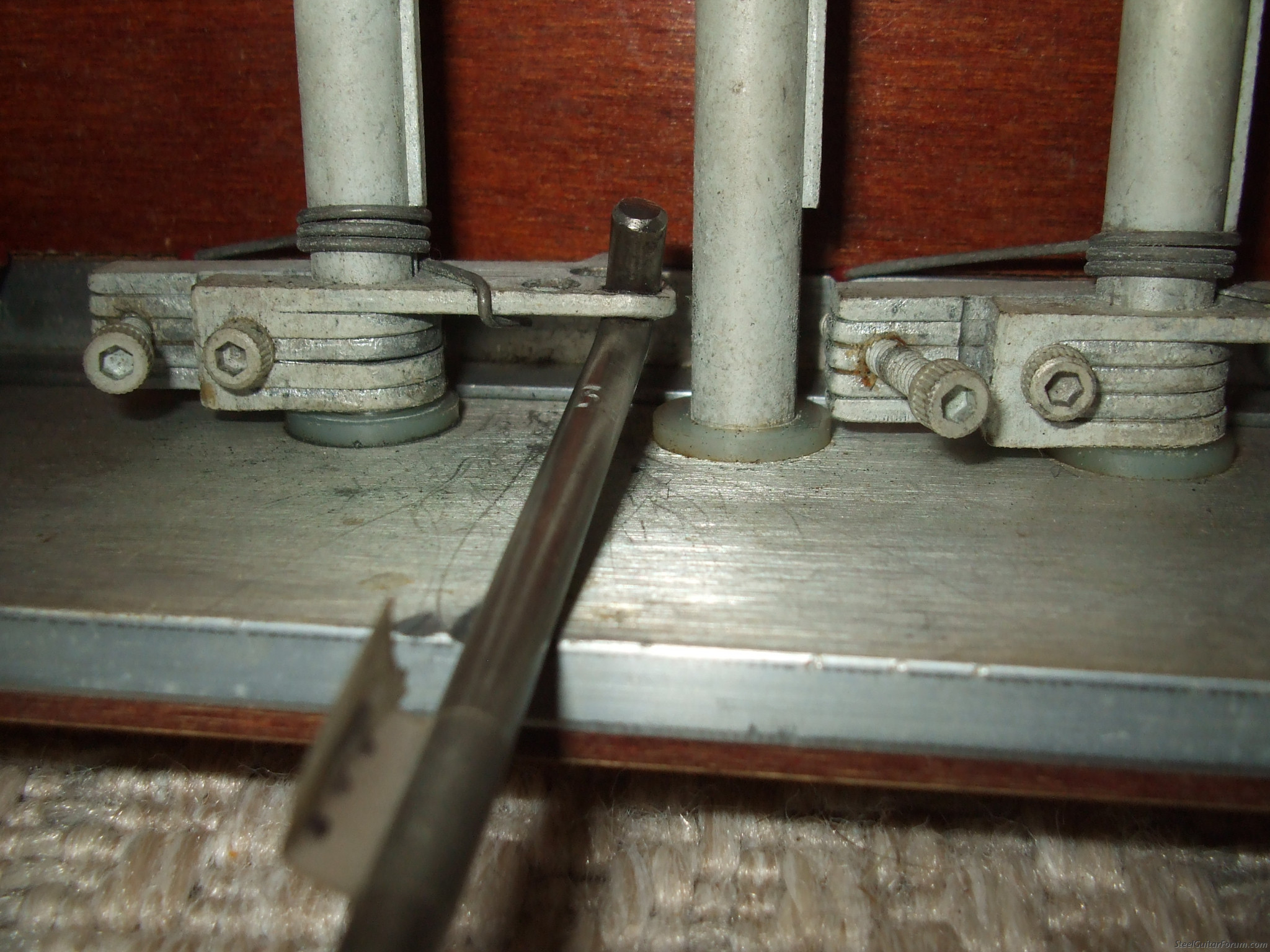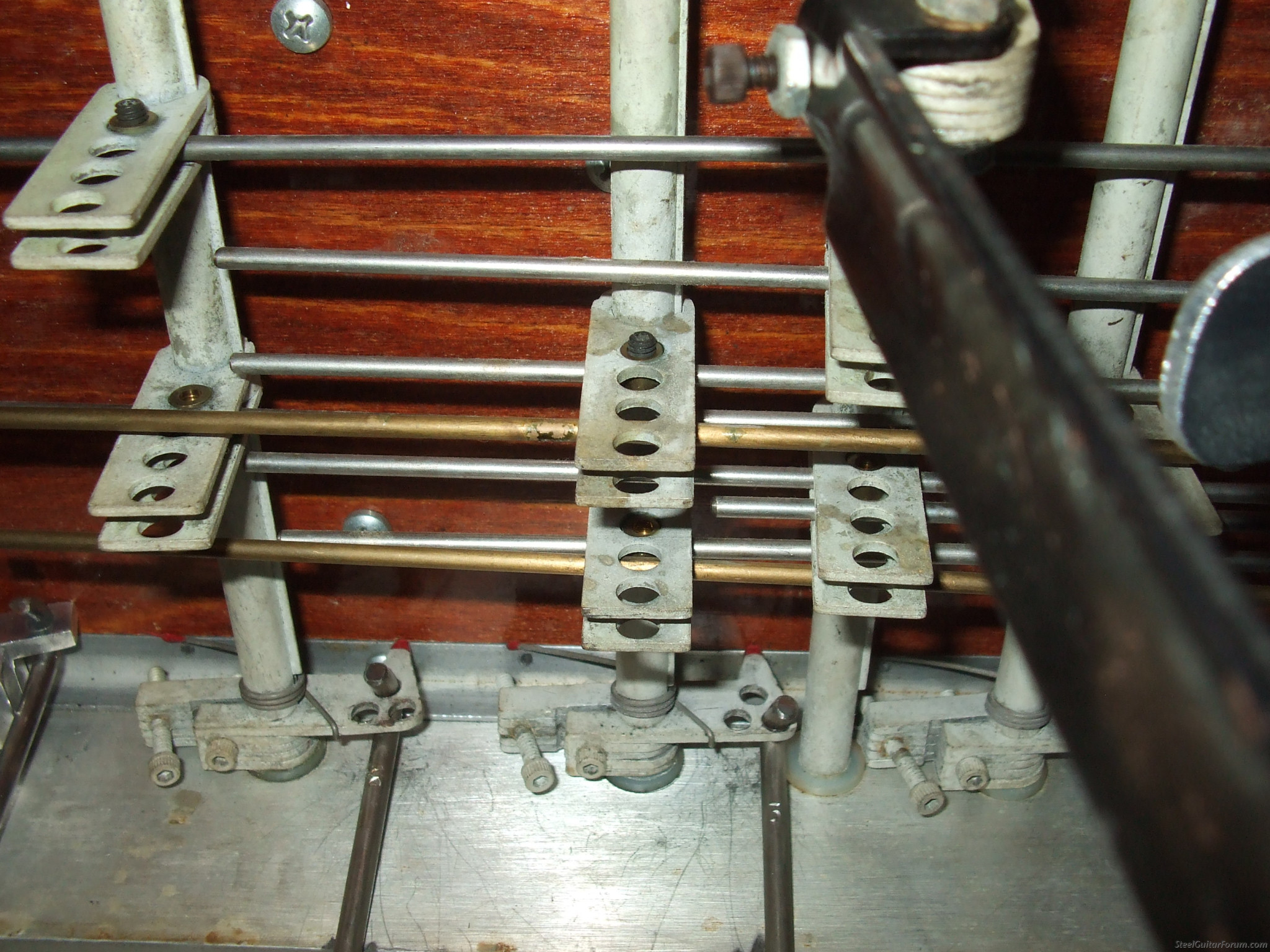Page 1 of 2
Another question, this time a pedal question
Posted: 26 Sep 2023 6:56 am
by Jerry Dragon
Concerning my A pedal. It has a lot more play in it than the B or C pedal. As a consequence it takes longer to reach it's full pull action than the other pedals. If I raise it to try and get some of the play out of it, then it is much higher than the other two. The other two and the Franklin pedal seem to work properly, I wouldn't really know. I have no one around here who knows anything about them and I am on the TN border! I knew more folk up north? How do I adjust this.
Thanx all.
J.D.
Posted: 26 Sep 2023 7:32 am
by Jim Palenscar
You don't say that kind of guitar it is however if you move the pull rods further way from the body on the bellcranks an equal amount it will shorten the throw.
Posted: 26 Sep 2023 8:52 am
by Pat Chong
Hi Jerry,
We're figuring you're still talking about your Dekley, right?
Anyway, the free-play is adjusted (1) by the stop-screw located on the shaft crank that you hook up your pedal rods to. Or (2), what Jim had brought out, about where the pull rods are located on the bell crank. Farther away from the shaft does shorten the throw, but makes the action stiffer. So you sometimes have to juggle between (1) and (2) to achieve how you want it to be.
Note: In adjusting your free play, make sure that your A & B pedals bottom out at the same level. Otherwise, if 1 bottoms out higher than the other and you press them both, they won't be in tune unless you cock your foot to compensate. (It is easier play when you don't have to remember to compensate.....)
Luck on the work.....Pat.
Posted: 6 Oct 2023 4:16 am
by Jerry Dragon
Yes, the Dekley. I am not that familiar with the nomenclature of the instrument. Are we talking about the top of the guitar where the pull rods go into the bell crank or down on the pedals where the rod connects to the ball on the pedal. I have adjusted the pedal end to no avail. There are two holes in the pedal, I could move the connecting ball on the pedal to the hole further away from the front of the guitar. I haven't looked at the undercarriage where the rods connect to the bell cranks to see if there is any adjustment there. I will take a look right now, there are three holes to choose from for the connecting rod. If you look at them straight on from the seating position they are in the configuration of an equilateral triangle. The rod is now connected to the lower right hand hole.

Posted: 6 Oct 2023 4:29 am
by Jerry Dragon
Thanx for the help by the way.
Posted: 6 Oct 2023 7:53 am
by Tommy Mc
By "play" do you mean that the pedal has a lot of slack before it even starts to engage the strings? Or do you mean that it has moretravel once the strings are engaged?
If it's just slack, you can take that up by tightening the pull rods, but I suspect you mean that there's more travel. That can be adjusted by moving the pull rods farther out on the bell crank. It's a gearing issue. You have a cross-shaft with a bell-crank and several options on where to attach the pull rod. The farther out from the cross-shaft, the more effect it has on the pull. Moving the pull rod to it's farthest out position will gear the pedal so that it takes less movement to pull the strings the same amount. But like all gearing, there is a tradeoff. The pedal will now feel stiffer because it's doing the same amount of work over less distance.
Posted: 6 Oct 2023 11:55 am
by John Hyland
A picture of the bell cranks for the A pedal is worth a 1000 words. Description like up and down are ambiguous depending on whether the PSG is on its legs or a bench to access the pull train.
Also some pedal rods can have alternate connection points at pedal and/or body which will change the pedal travel without affecting the pull/bellcrank adjustment
Posted: 6 Oct 2023 12:33 pm
by Jerry Dragon
I can't get a good picture of it. Anyway I am referring to the guitar the way it is sitting in the picture I posted. "Further away from the body", what does that mean? Towards the front of the guitar, towards the back of the guitar or down closer to the pedals? I will just fool around with the different holes and see what gives I don't like moving the rod on the pedal closer to me because I have a tendency to hit the rods when I pivot my foot now. I wish the pedals were a bit longer. Anyway, I will fool with it and see what gives.
Thanx again for the help
Posted: 6 Oct 2023 12:35 pm
by Jerry Dragon
Moved the rod at the pedal to the hole closer to me when sitting at the guitar. Moved it at the bell crack to the hole closet to the top of the guitar. Readjusted and she seems to be working a lot better. I will have to play it somemore to really see.
Thanx again.
Posted: 6 Oct 2023 12:44 pm
by Landon Johnson
To visualize this, think of using a wrench. If the bolt is too tight, we extend the radius of the torque by making the wrench longer (sometimes with a piece of tubing). This amplifies the torque or turning force, but to get the same amount of rotation requires a longer arc. So you gain a mechanical advantage at the expense of increased kinetic output. Moving any pull rod away from its pivot point will have this effect, wheter it is the pedal rods or the pull rods, or even the changer. All use leverage through a radius to determine travel and pressure at each individual joint.

Posted: 6 Oct 2023 6:13 pm
by Bobby D. Jones

Here is a picture of a GFI under neath.
The 2 bell cranks at top of the picture are set for the shortest movement on the pedals, Longest pull on Changer Levers and the string.
The closer the rod is hooked in the Bell Crank to the Cross Shaft/Rod,(Square rod in picture), The shorter the pull easier the pedal is to shove down.
As shown in the picture, The brass rod connectors are in different bell crank holes to adjust the proper length of each pull.
Also the pedal/cross rod stop, Usually in area where the pedal rods connects with Cross Shaft/Rod. A screw with a lock nut on it, And the pedal rod being shortened or lengthened at the pedal rod connection, Are used to even the height of the pedals at rest and at bottom of being shoved down.
Hope this helps, Happy Steelin.bj
Posted: 7 Oct 2023 2:26 am
by Jerry Dragon
Like I stated. I don't know the names of all the parts. What I am calling the bell crank that I was moving the rod in was the rod that runs up from the pedals to the first "bell crank" that is against the inside of the front of the guitar. I have not touch any of the rods that run horizontally to pull the strings. I will flip it over today and try and get a good picture. I am getting old and this thing is heavy as you all know. Last year I was putting my table saw back together after moving here and went to flip it over and I went down with it. I got stuck between the legs. I was in the basement and thought I was going to have to call the wife down to help me get out! Took me awhile to extract myself. Took all the skin off my shins as they scraped along the underside as I slowly went down lol. I should have just let it fall but I thought I could handle it.
Posted: 7 Oct 2023 3:36 am
by Jerry Dragon
Posted: 7 Oct 2023 3:52 am
by Jerry Dragon
Now for some questions about the pictures. Looking straight down at the pedals it is easy to see how far off they are from one another. I should probably adjust them the way she sits and get them even?
I notice quite a few bell cranks that are not perpendicular to the body but at an angle, is that common?
The lever that the pedal rod connects into near the top of the guitar, against the front, is that also called a bell crank?
The rods? There are the pedal rods, the others that run horizontally are called? Pull rods?
Is there somewhere on the site that shows a diagram of a PSG with all the parts named? In the books I have they only go over a few.
I see there are lots of different ways to do adjustments.
The guitar was gone over by Stu Schumann before I left N.Y. and he said is was set up pretty good.
Since then I have moved the studs with the balls on them, what are they named? that are on the pedal. There were two holes in the pedal to choose from, I moved them all to the holes nearest the front because I kept hitting the pedal rods when pivoting my foot and this gave me more room. Then I had a hell of a time. Everything was out of tune, all the pedals and knees. I came here for help and we got her back up and going. I also changed the Franklin pedal to lower both G# strings a half step to G. Prior to that it was lowering one G# string a whole step and another string which I don't remember, a whole step. The guitar has also been taken apart and put in and out of the case a few times since Stu checked it out. I am just including this to give a little background.
One last question. Pertaining to auto mechanics, when referencing anything in the system, everything is oriented from the drivers seat. So, when I say the left cylinder head, when looking at the engine from the front of the car I know I want the cylinder head on my right.
Is there a rule for that on the PSG?
I am learning and my playing is getting better. I can improvise fairly decently but when it comes to actually playing melodies note for note and such I am still having a hard time hitting the strings I am aiming for.
Thanx again folks.
Posted: 7 Oct 2023 4:00 am
by Jerry Dragon
Another thing that kills me on these contraptions after 58 years of guitar playing is the fact the upper two strings are lower in pitch than the strings below them. When trying to incorporate them into runs, because my first tendency is to hit a higher note on the strings in order of the strings on the guitar, I keep mixing the strings up I want to hit. I think you guys know what I mean?
I love this beast.
Posted: 7 Oct 2023 8:47 am
by Jerry Dragon
I don't know how to draw arrows on pictures so, here it ges.
Now that I have her laying on her side I am seeing other things. When all four pedals are pushed down they come to a stop at different heights. I see the stop is controlled by a screw in the "bell crank" that the pedal rod is connected to that comes into contact with the underside of the top of the guitar. Should I adjust these screws so they all stop at the same height? If I do that then I will have to retune all the strings the pedals pull by using the tuners in the end of the guitar? (What are they called lol)
Also, once a pedal is pressed down and released it doesn'always return to the same spot. If I let any of the pedals but the C pedal up slowly and lighly they will stop, but there is still a good distance they could go up before they came to a dead stop where they couldn't go further. If I let off the pedals quickly they will rise higher than if I ease off them. (Maybe it could use new return springs?) They are returning in tune despite the difference of their return height. Shouldn't the return springs pull the pedals all the way back up until they are physically stopped? No matter how I let off the pedals there is still further the return springs could be pulling them. The C pedal returns fully until the little leg on the bell crank contacts the underside and it can go no further. The A and B pedals have further to go. I can see how much and I can lift them by hand until the legs on the cranks come into contact. The Franklin pedal has no return spring and it has all kinds of play in it. I have to tune one string about every week on the end of the guitar. The neck tuners are good.
It seems to me, under ideal conditions, the strings the pedals pull will be in tune when they reach their stop point on the way down and all at the same height, and upon return they should all stop at the same height and be in tune? I know there will be play, but there seems to be quite a bit going on here. As a lifelong machinist, carpenters tolerances scare the crap out of me. How much play is too much?
I am not asking or expecting you guys to teach me the name of all the parts but if someone could direct me to a diagram that has ll the parts named I would greatly appreciate it. Not being able to communicate effectively by not knowing the names of the parts makes it probably harder on you guys than me. I am going to leave her laying on her side and not touch anything until I hear from you guys and get some advice. If I knew of anyone or anywhere around here to take it to I would. I have asked at all the music stores in the Tenn. Tri City Area. Put a notice in the local are on Craigslist look for someone who knows something, no go.
I thank all of you for your help. This contraption is difficult enough without all the mechanical issues that can arrise.
Posted: 7 Oct 2023 9:01 am
by Landon Johnson
Did you try looking for a GFI manual? Or, you can check any manufacturer they work similar - like Ford vs Chevy - same parts, different fit.
I have a Williams so I go here.
https://www.williamsguitarcompany.com/m ... asictuning
Posted: 7 Oct 2023 9:15 am
by Jerry Dragon
Thanx, that should help.
What I have been calling a bell crank is the pedal actuator arm! See, it has helped already.
Posted: 7 Oct 2023 10:41 am
by Jerry Dragon
The wife came up with a good suggestion. She said, "you're only 5 hrs away from Nashville." Maybe I can set up an appointment, take it to someone, have them go through a set up with me and get it set just right. How long would it take someone who knows what they're doing to set it up? I don't want to have to leave it there and have to drive to Nashville twice.
In the meantime I am here and I am learning.
Posted: 7 Oct 2023 3:37 pm
by Bill Moore
You can find a Dekley manual at the web page:
http://steelguitar.com/manuals.html
Posted: 7 Oct 2023 3:52 pm
by Bobby D. Jones
The pictures explain a lot. The Cross Rod Lever that the pedal rod hooks into, Is a very good piece of engineering to allow another adjustment in the pull train, With 3 different holes to attach the pedal rod in.
Are the pedal rods numbered or letter marked?
May want to move the rods from pedal to pedal and the holes on the bar, This may level the pedals up.
The adjustment on the rods (In the connector where it attaches to the pedal) With the lock nut and threads on rod. you can adjust the pedals to height you want.
But, You must make sure you mark and place the pedal rods in the same hole every time, And the rods on the same pedal or it will change every time the pedal rods are removed and replaced.
Those holes in the bar is sort of a puzzle to figure out and work with.
Good luck getting the pedals set up, Happy Steelin.
Posted: 8 Oct 2023 12:16 am
by Jerry Dragon
Thank you, that is very informative.
Posted: 8 Oct 2023 9:03 am
by Steve Lipsey
Jerry-
the two higher strings were added after the pedal steel had been around for a while, so they just threw them on top to not confuse existing players, is my understanding.
But it fact it helps enable playing faster, using fingerpicks that is hard to do in a straight line, but you can alternate pick thumb and a finger back and forth to go fast on those top 5 strings in pitch order...
Posted: 8 Oct 2023 11:41 am
by John Hyland
Btw some lubrication looks in order.
Posted: 9 Oct 2023 2:17 am
by Jerry Dragon
Steve Lipsey wrote:Jerry-
the two higher strings were added after the pedal steel had been around for a while, so they just threw them on top to not confuse existing players, is my understanding.
But it fact it helps enable playing faster, using fingerpicks that is hard to do in a straight line, but you can alternate pick thumb and a finger back and forth to go fast on those top 5 strings in pitch order...
I have no problem picking quickly. It is in the brain, not the hands. The brain keeps telling the hands the higher note is on the string further away. I have been practicing runs by using the V chord on a straight bar position with no knees or pedals using the 5,9 and 10 strings for the chord and working the scales off them. When it comes to a phrase using strings 8,9 and ten my brain keeps telling the hands the higher notes are on string 9 and 10. It is going to be a tough habit to break.









